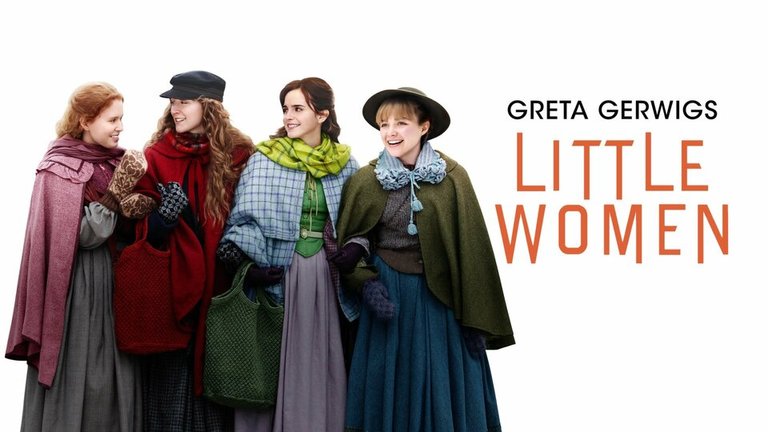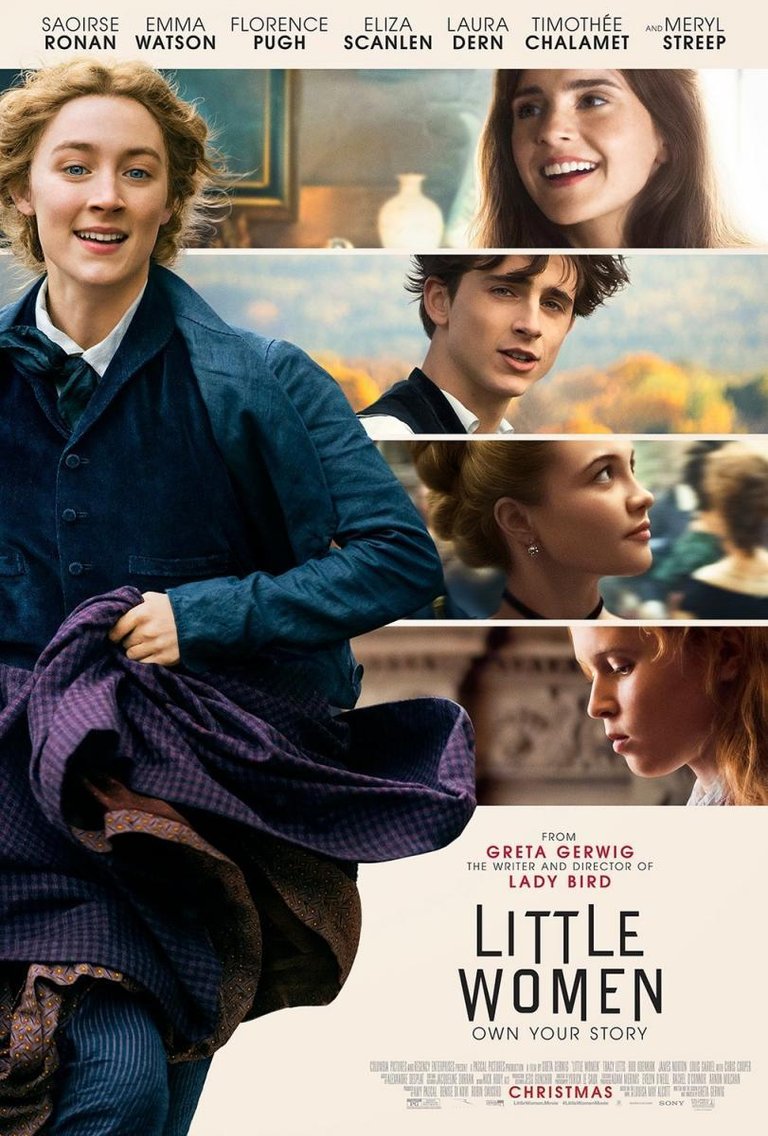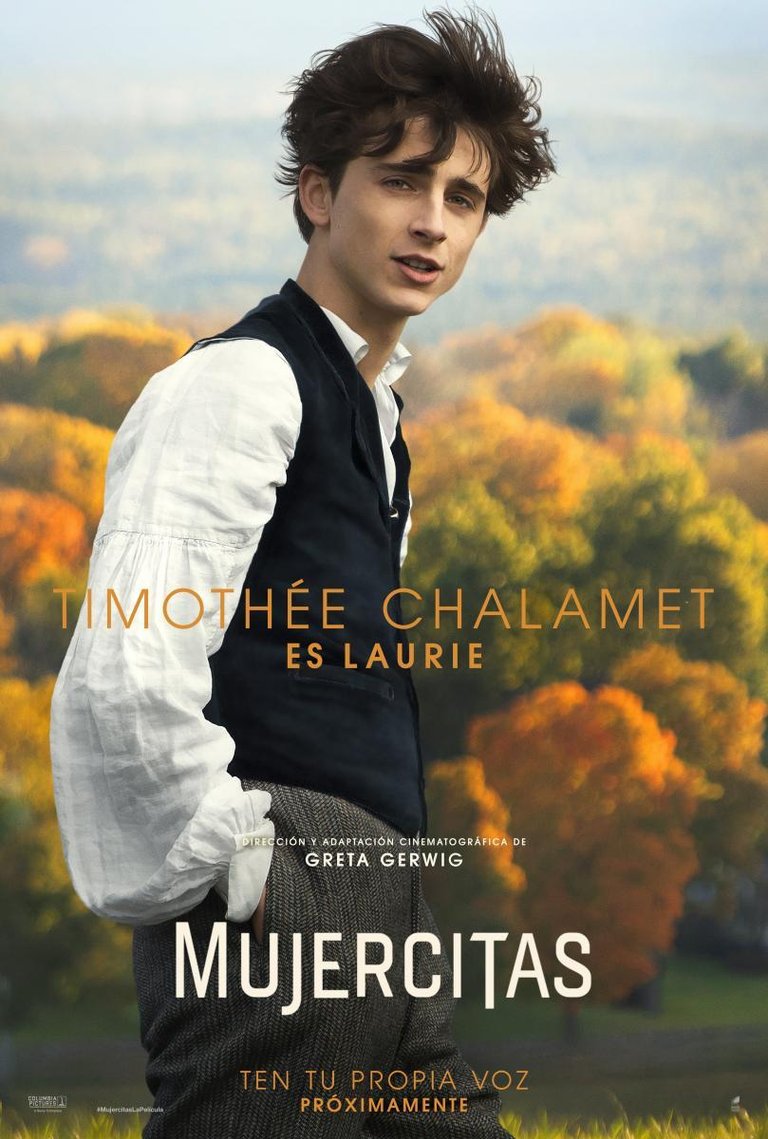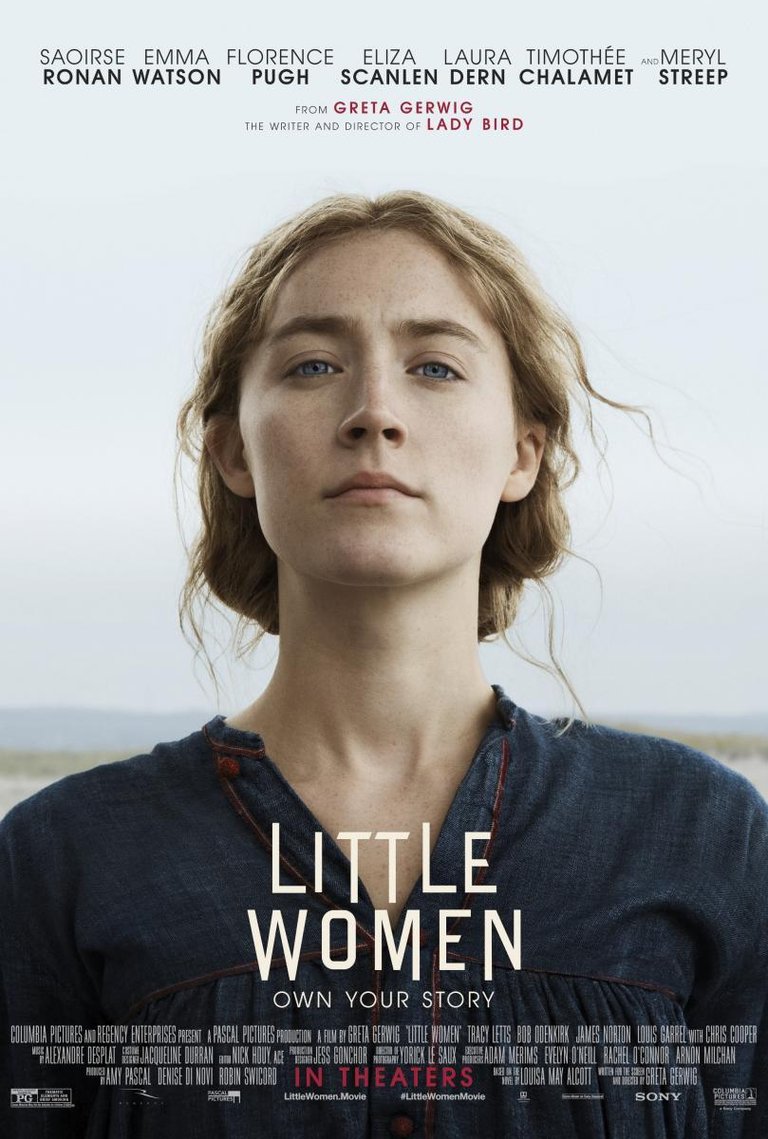Little Women (2019): a classic for fall | un clásico para el otoño

Basado en la novela clásica
Last week I was busy uploading posts related to the Oscars, but I also watched some movies that week and now that the awards season is over and I'm going back to my routine of uploading reviews of these movies, I can't think of a better way to do it that with this extraordinary film that I hadn't seen until last Sunday afternoon.
La semana pasada estuve ocupado subiendo publicaciones referidas a los premios Oscars, pero de igual forma vi algunas películas esa semana y ahora que ya ha acabado la temporada de premios y vuelvo a mi rutina de subir reseña de estas películas no se me ocurre una mejor manera que hacerla con esta extraordinaria película que no había visto hasta la tarde del domingo pasado.
Little Women is a film directed by Greta Gerwig (Barbie, Ladybird) and written by herself based on the 1868 novel by Louisa May Alcott. It tells the story of the Marches, four teenage sisters, Jo, Beth, Meg and Amy, who live with their mother in a town in the North American countryside while their father fights in the Civil War. Each of them has their own character and an artistic vocation: Jo is the writer and the sister with the wildest character, free spirit and a desire to travel the world; Meg is a very good actress and is calmer than her sister, she has a serene character and kind wisdom; Beth, who loves to play the piano, is considered by her sisters to be the best, with the noblest spirit and purest feelings; and Amy, with a personality perhaps a little more explosive than Jo's, which is why she clashes the most, and the desire to become a great fine arts artist. They all live with their mother, Marmee, a quiet, charitable and loving woman who must watch over her daughters while her husband Robert fights in the civil war. The economic condition of the Marches is not one of misery, but it's far from comfortable. They live narrowly, although unnecessarily, but in large part it's because they like to share the little they have left (they had more money in the past) with those most in need. In this context we witness the development and growth of the girls, their youthful desires, the discovery of the world, love and life.
Little Women es una película dirigida por Greta Gerwig (Barbie, Ladybird) y escrita por ella misma a partir de la novela de 1868 de Louisa May Alcott. En ella se cuenta la historia de las March, cuatro hermanas adolescentes, Jo, Beth, Meg y Amy, quienes viven con su madre en una pueblo del campo norteamericano mientres su padre lucha en la Guerra Civil. Cada una de ellas tiene su propio carácter y una vocación artística: Jo es la escritora y la hermana de carácter más salvaje, espíritu libre y un anhelo de recorrer el mundo; Meg es una actriz muy buena y es más calmada que su hermana, tiene un carácter sereno y una sabiduría bondadosa; Beth, quien ama tocar el piano, es considerada por sus hermanas como la mejor, la de espíritu más noble y sentimientos más puros; y Amy, con una personalidad quizás un poco más explosiva que la de Jo, por eso es con quien más choca, y el deseo de convertirse en una gran artista de las artes plásticas. Todas ellas viven con su madre, Marmee, una mujer tranquila, caritativa y amorosa que debe velar por sus hijas mientras su esposo Robert lucha en la guerra civil. La condición económica de los March no es de miseria, pero dista mucho de ser acomodada. Viven con estrechez, aunque sin necesidad, pero en gran parte se debe a que les gusta compartir lo poco que les queda (tuvieron más dinero en tiempos pasados) con los más necesitados. En ese contexto asistimos al desarrollo y crecimiento de las chicas, sus anhelos juveniles, el descubrimiento del mundo, el amor y la vida.

One of the geniuses of this version by Greta Gerwig, in addition to impeccable direction, was the fact that she narrated the film in non-linear time. That is, instead of telling us about the girls' adolescence and then their youth in the natural order of events, the events from before, when they were younger, constantly alternate with those from the present, when they are adults. This forces the viewer to remain attentive and be curious about that in-between and the causes that led to those consequences.
Una de las genialidades de esta versión de Greta Gerwig, además de una dirección impecable, fue el hecho de haber narrado la película en un tiempo no lineal. Es decir, en lugar de contarnos la adolescencia de las chicas y luego su juventud en el orden natural de los acontecimientos, constantemente se van alternando los hechos de antes, cuando eran más jóvenes, con los del presente, cuando son adultas. Esto obliga al espectador a permanecer atento y a sentir curiosidad por ese entremedio y las causas que condujeron a esas consecuencias.
Furthermore, the story is very good, the development of the characters, the revelations of their motives, their desires, their passions, they are characters that are alive and although I have not read the novel I am sure that it is like that in the pages of the book and Greta knew how to bring that to the screen, supported by a luxury female cast: Saoirse Ronan (Jo), Emma Watson (Meg), Florence Pugh (Amy), Eliza Scanlen (Beth), the experienced Laura Dern (Marmee) and the only and incomparable Meryl Streep (Aunt March). And they are joined by Bob Odenkirk as the father of the March family who is at war and the very talented Timothée Chalamet as Laurie, the March neighbor who will become their friend and a constant presence during the girls' adolescence and who will eventually develop romantic feelings for Jo. So there is a family plot in the middle, there is war, charity, romance, but it also talks about the role of women in society at a time when a woman could not have her own fortune unless she was from a wealthy family (like the case of Aunt March) because she could not access well-paid jobs and once she had married, her money became the property of her husband and then of the children they had in common, so for a girl from a poor family or from middle class, the only way to access a life with comfort was through marriage, little more than selling oneself to be able to live well.
Además, la historia es muy buena, el desarrollo de los personajes, las revelaciones de sus motivos, sus anhelos, sus pasiones, son personajes que están vivos y aunque no he leído la novela estoy seguro de que es así en las páginas del libro y Greta supo llevar eso a la pantalla, apoyada en un elenco femenino de lujo: Saoirse Ronan (Jo), Emma Watson (Meg), Florence Pugh (Amy), Eliza Scanlen (Beth), la experimentada Laura Dern (Marmee) y la única e incomparable Meryl Streep (la Tía March). Y a ellas se suman Bob Odenkirk como el padre de la familia March que está en la guerra y el talentosísimo Timothée Chalamet como Laurie, el vecino de las March que se convertirá en su amigo y en una presencia constante durante la adolescencia de las chicas y que, eventualmente, desarrollará sentimientos románticos hacia Jo. Así que hay una trama familiar en medio, hay guerra, caridad, romance, pero también se habla del papel de la mujer en la sociedad en una época en que una mujer no podía tener su propia fortuna a menos que fuera de familia adinerada (como el caso de la tía March) porque no podía acceder a trabajos bien remunerados y una vez se hubiera casado su dinero pasaba a ser patrimonio de su esposo y luego de los hijos que tuvieran en común, así que para una chica de familia pobre o de clase media, la única forma de acceder a una vida con comodidades era a través del matrimonio, poco más que venderse para poder vivir bien.

Is it a feminist film, then? Of course, what did you expect? It is an adaptation written and directed by a woman based on the novel written by another woman and starring five female characters. Logically, the woman is the center of the plot, but the story - and the film - is much more than that and is actually very well done on a technical level, the photography and editing are extraordinary. In several places I have seen that the adjective feminist is used as if it were a negative feature in a novel, a movie or a work of art (many criticized or did not understand Barbie), but in my opinion it is one more reason to love a story how are you doing. Because the film was released in December and there are also allusions to charity with those in need and scenes in the snow, some tend to see it as a Christmas movie. For me, it seems more conducive to autumn: the falling leaves, the cooling temperatures and reading under the protection of a fireplace make me a more conducive context to fall in love with these characters, whether on the screen or on the written pages. by Alcott. Little Women is a beautiful movie and now I understand why several people I know have it as one of their comfort movies, who of you have seen it? I read you in the comments.
¿Es una película feminista, entonces? Por supuesto, ¿qué esperaban? Se trata de una adaptación escrita y dirigida por una mujer basada en la novela escrita por otra mujer y protagonizada por cinco personajes femeninos. Lógicamente la mujer es el centro de la trama, pero la historia - y la película - es mucho más que eso y en verdad está muy bien hecha a nivela técnico, la fotografía y el montaje son extraordinarios. En varios sitios he visto que se ocupa el adjetivo de feminista como si fuese un rasgo negativo en una novela, una película o una obra de arte (muchos criticaron o no entendieron Barbie), pero en mi opinión es una razón más para amar una historia como esta. Debido a que la película fue estrenada en diciembre y hay también alusiones a la caridad con los más necesitados y escenas en la nieve, algunos suelen verla como una película navideña. A mí se me hace más propicia para el otoño: las hojas que caen, las temperaturas que refrescan y lecturas al amparo de una chimenea se me hacen un contexto más propicio para enamorarse de estos personajes, ya sea en la pantalla o en las páginas escritas por Alcott. Little Women es una hermosa película y ahora entiendo porque varias personas que conozco la tiene como una de sus comfort movies, ¿quiénes de ustedes la han visto? Los leo en los comentarios.
Reseñado por @cristiancaicedo
Other posts that may interest you | Otros posts que pueden interesarte:
 |
|---|



Definitivamente esta novela fue una adaptación grandiosa del libro, una de las mejores, se nota la esencia de Louisa May Alcott en todo momento, me recordó a la adaptación que hicieron una vez aquí en Venezuela de "Mujercitas" con Adrian Delgado y Daniela Alvarado, sin embargo esta es incluso más precisa, las actuaciones fueron de 10, muy bien logradas.